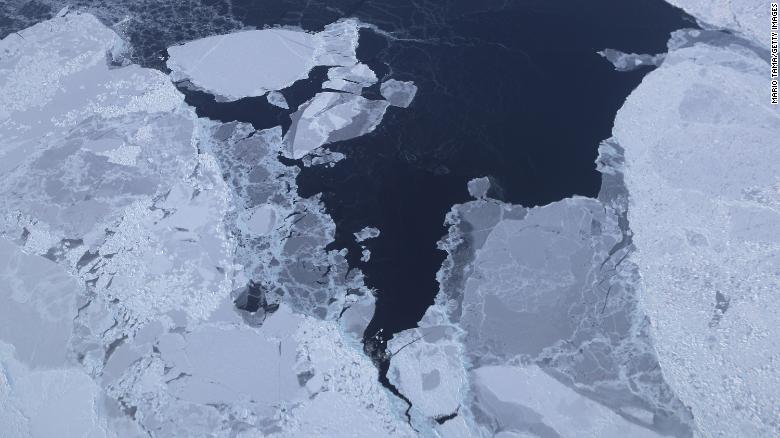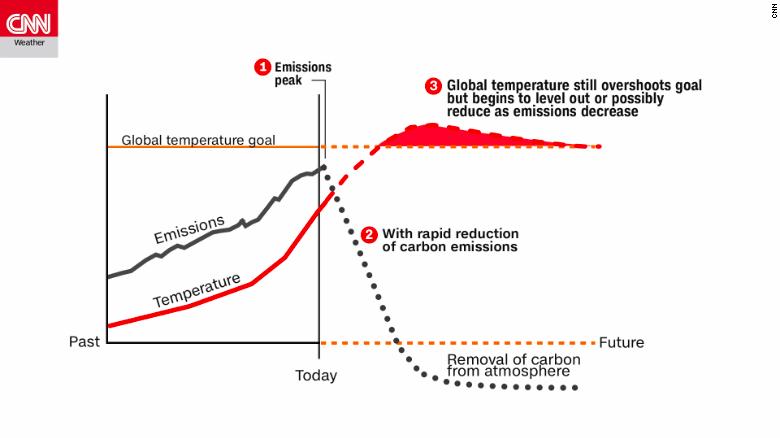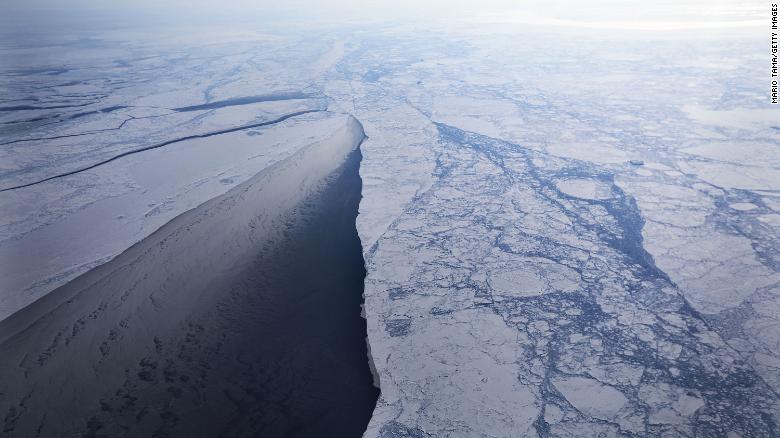begin quote from: Drastic and immediate change needed to stem climate change dangers
Experts say only drastic, immediate change can save us from the dangers of climate change
By Brandon Miller and Jay Croft, CNNUpdated 10:09 PM ET, Sun October 7, 2018(CNN)Holding global warming to a critical limit would require "rapid, far-reaching and unprecedented changes in all aspects of society," says a key report from the global scientific authority on climate change.The Intergovernmental Panel on Climate Change (IPCC) report was released Monday at the 48th Session of the IPCC in Incheon, South Korea.It focuses on the impacts of global warming reaching 1.5 degrees Celsius (2.7 degrees Fahrenheit) above pre-industrial levels. The planet is already two-thirds of the way there, with global temperatures having warmed about 1 degree C. Sea ice is seen from NASA's Operation IceBridge research aircraft off the northwest coast of Greenland. Scientists say the Arctic has been one of the regions hardest hit by climate change.Monday's report is three years in the making and is a direct result of the 2015 Paris Climate Agreement. In the Paris accord, 197 countries agreed to the goal of holding global temperatures "well below" 2 degrees C above pre-industrial levels and to pursue efforts to limit it to 1.5 degrees C.The United States was initially in the agreement. But President Donald Trump pulled the country out a year and half later, claiming it was unfair to the country.
Sea ice is seen from NASA's Operation IceBridge research aircraft off the northwest coast of Greenland. Scientists say the Arctic has been one of the regions hardest hit by climate change.Monday's report is three years in the making and is a direct result of the 2015 Paris Climate Agreement. In the Paris accord, 197 countries agreed to the goal of holding global temperatures "well below" 2 degrees C above pre-industrial levels and to pursue efforts to limit it to 1.5 degrees C.The United States was initially in the agreement. But President Donald Trump pulled the country out a year and half later, claiming it was unfair to the country.'Possible with the laws of chemistry and physics'
To limit global warming to 1.5 degree C is "possible within the laws of chemistry and physics," said Jim Skea, co-chair of IPCC Working Group III. "But doing so would require unprecedented changes."Widespread changes would be needed in energy, industry, buildings, transportation and cities, the report says. Global net emissions of carbon dioxide would need to fall by 45% from 2010 levels by 2030 and reach "net zero" around 2050. This chart from the IPCC shows how global temperatures would respond to a sudden and drastic reduction of greenhouse gas emissions. Even with immediate action, global temps will still overshoot the goal, but could reduce back to the target over time.In Paris, the world's governments tasked the IPCC with preparing this special report to detail the impacts that climate change of 1.5 degree C will bring, what will be required to prevent further warming and what mitigation and adaptation options are available for countries to deal with these impacts.More than 90 authors from 40 countries were involved in leading the report, helped by 133 contributing authors. The report pulls together the current understanding of the scientific community on climate change and includes citations of more than 6,000 peer-reviewed scientific articles and studies."One of the key messages that comes out very strongly from this report is that we are already seeing the consequences of 1 degree C of global warming through more extreme weather, rising sea levels and diminishing Arctic sea ice, among other changes," said Panmao Zhai, co-chair of IPCC Working Group I.The report cites specific examples of how impacts of global warming would be lessened with the 1.5 degrees C increase, compared to the 2 degees C increase:
This chart from the IPCC shows how global temperatures would respond to a sudden and drastic reduction of greenhouse gas emissions. Even with immediate action, global temps will still overshoot the goal, but could reduce back to the target over time.In Paris, the world's governments tasked the IPCC with preparing this special report to detail the impacts that climate change of 1.5 degree C will bring, what will be required to prevent further warming and what mitigation and adaptation options are available for countries to deal with these impacts.More than 90 authors from 40 countries were involved in leading the report, helped by 133 contributing authors. The report pulls together the current understanding of the scientific community on climate change and includes citations of more than 6,000 peer-reviewed scientific articles and studies."One of the key messages that comes out very strongly from this report is that we are already seeing the consequences of 1 degree C of global warming through more extreme weather, rising sea levels and diminishing Arctic sea ice, among other changes," said Panmao Zhai, co-chair of IPCC Working Group I.The report cites specific examples of how impacts of global warming would be lessened with the 1.5 degrees C increase, compared to the 2 degees C increase:- Global sea levels would rise 10 cm lower by 2100
- The likelihood of an Arctic Ocean free of sea ice in summer would be once per century, instead of at least once per decade
- Coral reefs would decline by 70% to 90% instead of being almost completely wiped out.
"Every extra bit of warming matters, especially since warming of 1.5 degrees C or higher increases the risk associated with long-lasting or irreversible changes, such as the loss of some ecosystems," said Hans-Otto Pörtner, Co-Chair of IPCC Working Group II.
To the best of my ability I write about my experience of the Universe Past, Present and Future
Top 10 Posts This Month
- Rosamund Pike: Star of New Amazon Prime Series "Wheel of Time"
- Belize Barrier Reef coral reef system
- SNAP rulings ease shutdown pressure as Thune rebuffs Trump call to end filibuster
- Flame (the Giant Pacific Octopus) whose species began here on earth before they were taken to another planet by humans in our near future
- Learning to live with Furosemide in relation to Edema
- I put "Blue Sphere" into the search engine for my site and this is what came up.
- Pacific Ocean from Encyclopedia Britannica
- Earthquake Scientists Say It's Time to Start Paying Attention to Antarctica
- Siege of Yorktown 1781
- Nine dead, dozens injured in crowd surge at Hindu temple in southern India
Subscribe to:
Post Comments (Atom)



















No comments:
Post a Comment